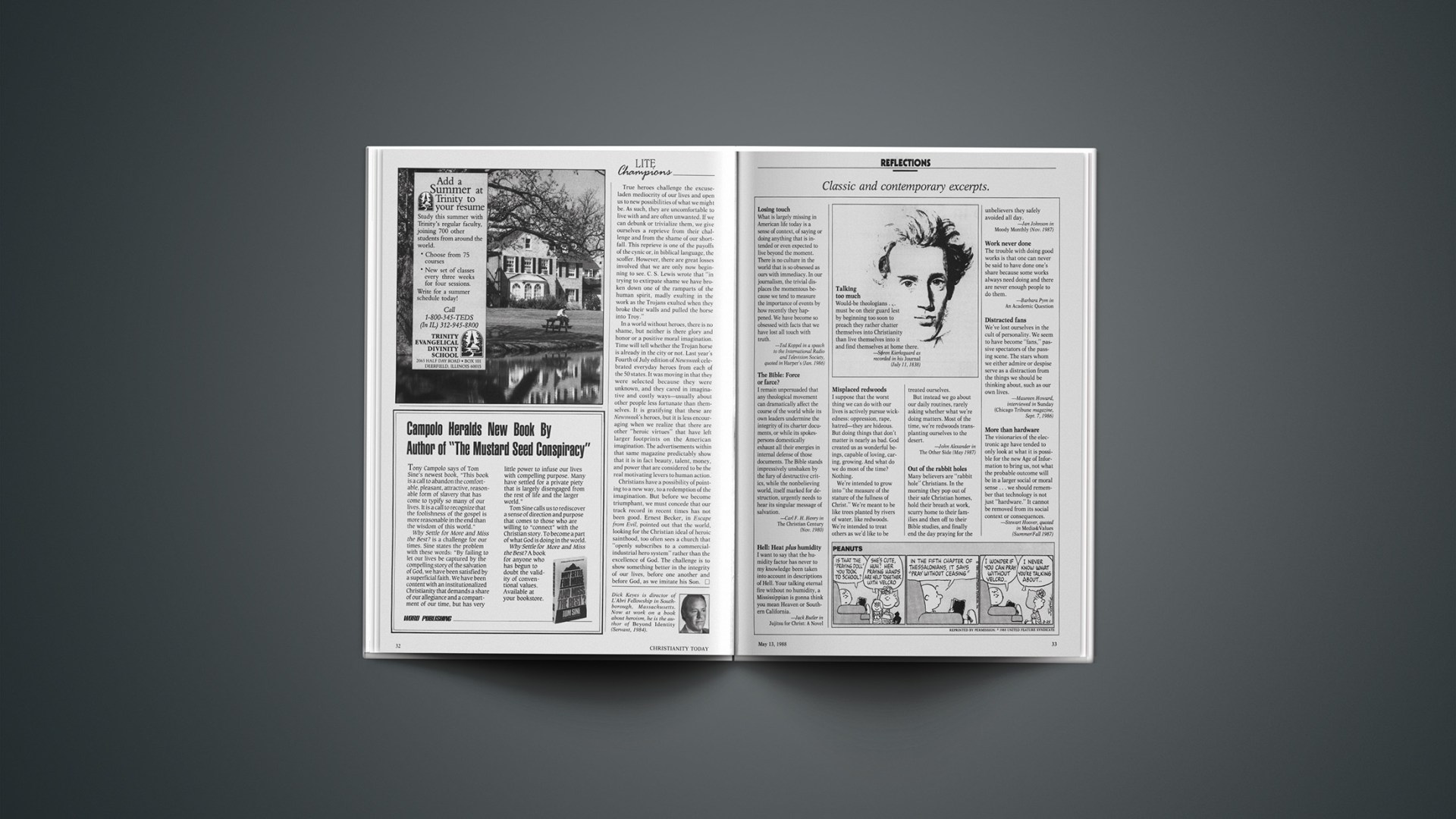Classic and contemporary excerpts.
Losing touch
What is largely missing in American life today is a sense of context, of saying or doing anything that is intended or even expected to live beyond the moment. There is no culture in the world that is so obsessed as ours with immediacy. In our journalism, the trivial displaces the momentous because we tend to measure the importance of events by how recently they happened. We have become so obsessed with facts that we have lost all touch with truth.
—Ted Koppel in a speech to the International Radio and Television Society, quoted in Harper’s (Jan. 1986)
The Bible: Force or farce?
I remain unpersuaded that any theological movement can dramatically affect the course of the world while its own leaders undermine the integrity of its charter documents, or while its spokespersons domestically exhaust all their energies in internal defense of those documents. The Bible stands impressively unshaken by the fury of destructive critics, while the nonbelieving world, itself marked for destruction, urgently needs to hear its singular message of salvation.
—Carl F. H. Henry in The Christian Century (Nov. 1980)
Hell: Heat plus humidity
I want to say that the humidity factor has never to my knowledge been taken into account in descriptions of Hell. Your talking eternal fire without no humidity, a Mississippian is gonna think you mean Heaven or Southern California.
—Jack Butler in Jujitsu for Christ: A Novel
Talking too much
Would-be theologians … must be on their guard lest by beginning too soon to preach they rather chatter themselves into Christianity than live themselves into it and find themselves at home there.
—Søren Kierkegaard as recorded in his Journal (July 11, 1838)
Misplaced redwoods
I suppose that the worst thing we can do with our lives is actively pursue wickedness: oppression, rape, hatred—they are hideous. But doing things that don’t matter is nearly as bad. God created us as wonderful beings, capable of loving, caring, growing. And what do we do most of the time? Nothing.
We’re intended to grow into “the measure of the stature of the fullness of Christ.” We’re meant to be like trees planted by rivers of water, like redwoods. We’re intended to treat others as we’d like to be treated ourselves.
But instead we go about our daily routines, rarely asking whether what we’re doing matters. Most of the time, we’re redwoods transplanting ourselves to the desert.
—John Alexander in The Other Side (May 1987)
Out of the rabbit holes
Many believers are “rabbit hole” Christians. In the morning they pop out of their safe Christian homes, hold their breath at work, scurry home to their families and then off to their Bible studies, and finally end the day praying for the unbelievers they safely avoided all day.
—Jan Johnson in Moody Monthly (Nov. 1987)
Work never done
The trouble with doing good works is that one can never be said to have done one’s share because some works always need doing and there are never enough people to do them.
—Barbara Pym in An Academic Question
Distracted fans
We’ve lost ourselves in the cult of personality. We seem to have become “fans,” passive spectators of the passing scene. The stars whom we either admire or despise serve as a distraction from the things we should be thinking about, such as our own lives.
—Maureen Howard, interviewed in Sunday (Chicago Tribune magazine, Sept. 7, 1986)
More than hardware
The visionaries of the electronic age have tended to only look at what it is possible for the new Age of Information to bring us, not what the probable outcome will be in a larger social or moral sense … we should remember that technology is not just “hardware.” It cannot be removed from its social context or consequences.
—Stewart Hoover, quoted in Media&Values (Summer/Fall 1987)










